Climate change - public engagement: survey results 2022
Results of a representative survey of the Scottish public, focused on attitudes and engagement with climate change. The results will act as a baseline for the Public Engagement Strategy for Climate Change.
4. Act
This section explores the actions that the Scottish public is already taking or wants to incorporate into their lifestyle in the future, and the reasons they may not want or feel able to.
4.1 Ease of getting involved in climate action
Four in 10 (39%) Scottish adults state they think it is difficult for members of the public to find opportunities to get involved in climate action. This is a higher proportion than the 23% of adults in Scotland who believe it is easy to do so (Figure 16). Almost half (47%) of those who are interested in getting involved in activities to combat climate change believe it is difficult to find opportunities to get involved in climate action - significantly higher than the average.
However, those who claim to know a lot about climate change, are more likely to find it easy to find opportunities to get involved. More than a third of this group (35%) say it is easy, compared to under a quarter (23%) of the general population.

Base: Unweighted base (1782), single response question
It is younger adults who think it is harder for the public to get involved in climate action. Table 7 shows that over half (52%) of 25-34-year-olds think it is difficult to find opportunities to get involved in climate action. Within this research, we are unable to tell what respondents might have done to look for opportunities to get involved in combatting climate change. However, because this age group are more engaged and informed, it is possible that they have actively looked for opportunities but have been unable to find them.
The proportion of adults who believe it is difficult to find opportunities to get involved in climate action then decreases as you go up the age categories, with around a third (29%) of those aged over 55-64 years old and aged 65 or over stating they believe it is difficult to come by opportunities to get involved in climate action (29% and 34%).
| Total | 14-17 | 18-24 | 25-34 | 35-44 | 45-54 | 55-64 | 65+ | |
|---|---|---|---|---|---|---|---|---|
| Net: Difficult (very difficult / somewhat difficult) | 39% | 37% | 47% | 52% | 40% | 35% | 29% | 34% |
Note: All statistically significant changes from the total are highlighted. Green highlights denote data significantly higher than total. Blue highlights denote data significantly lower than total.
4.2 Impact on Scotland reaching net zero emissions
When asked about different Scottish actors and the impact they have on helping Scotland reach net zero emissions, there are a range of perceptions. Few actors are seen as having a 'very positive' impact, although the 'somewhat positive' figures are higher. Figure 17 shows that adults consider large businesses to have the most negative impact on helping Scotland reach net zero emissions of all the actors listed, with four in 10 (39%) ranking them as negative.
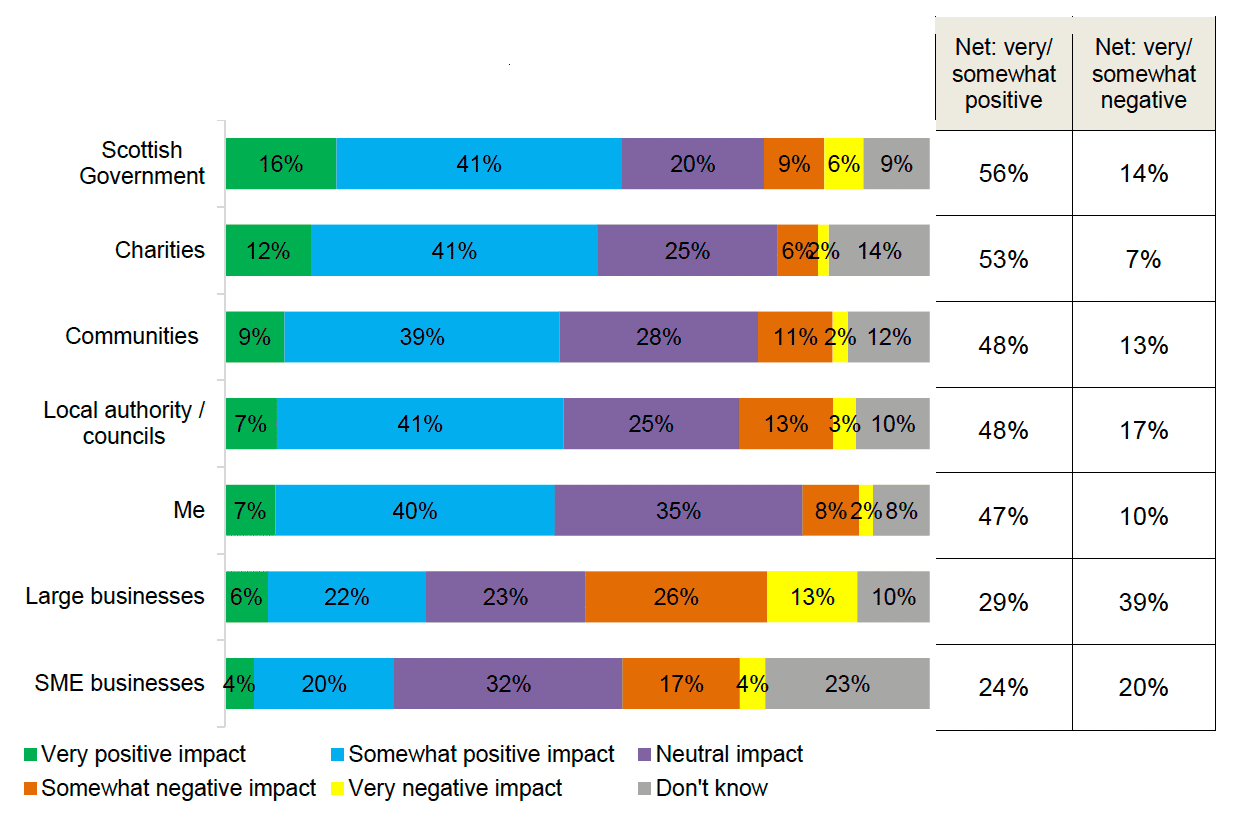
Base: Unweighted base (1782), single response question
The Scottish Government is perceived to have the most positive impact with over half (56%) agreeing they have a positive impact, followed by charities and the third sector (53%) and communities and local authorities/councils (48%). When rating their personal impact on helping Scotland reach net zero emissions, nearly half (47%) of Scottish adult's state they have a positive impact.
Respondents were then asked whether they believe these actors are doing enough or not doing enough to help Scotland reach net zero emissions. Even actors who are generally seen as having a positive impact on helping Scotland reach net zero emissions are not seen as doing enough at the moment (Figure 18). For example, the Scottish Government is seen as having a positive impact overall on helping Scotland reach net zero emissions, and yet almost half of Scottish adults say the government is not currently doing enough (49%) – implying that they feel they could be doing even more. Similarly, local authorities and councils are perceived as having a positive impact on reaching net zero emissions, with almost half (48%) of respondents saying so and yet, over half (53%) of respondents say they are not currently doing enough.
Overall, more people say charities are doing enough or more than enough to help Scotland reach net zero emissions than any other actors, with over two fifths saying they are at doing enough or more than enough (44%). This is followed by people themselves, with 42% of Scottish adults saying they believe they are doing enough or more than enough to help Scotland reach net zero emissions.
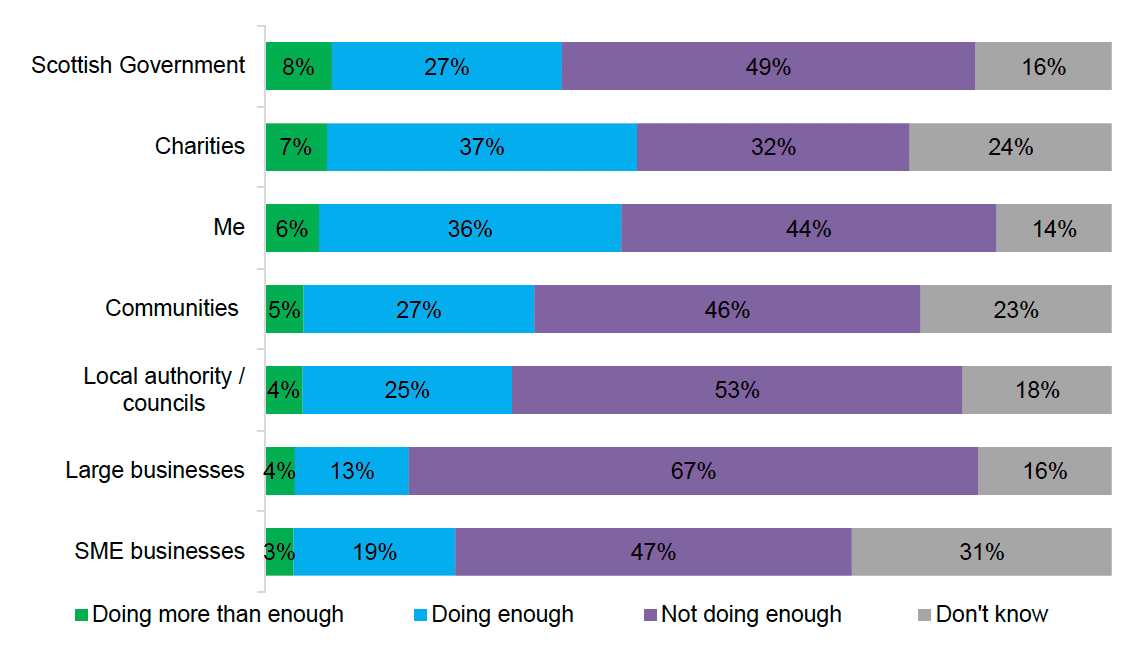
Base: Unweighted base (1782), single response question
Across all age groups, large businesses are the group most likely to be considered to not be doing enough to help Scotland reach net zero emissions. 25-34-year-olds are the age category most likely to rank themselves as 'not doing enough', which may reflect greater levels of knowledge and concern in this age group, rather than necessarily less action.
4.3 Pro-environmental actions
The pro-environmental action that most respondents currently do is recycling packaging, with the majority (93%) of respondents saying they do this – 70% saying they do so always. Recycling is followed by eating more plant-based foods, with over half (54%) of respondents saying they do this (Figure 20). Approximately a quarter (26%) of respondents currently live car free. Only around one in ten (12%) plan to live car free in the future, with the majority (59%) stating they do not live car free and do not plan to do so. Having renewable based heating in their house is the action that the least respondents stated that currently do (12%). Over a third (37%) of respondents stated that they plan to have renewable based heating in the future. However, 37% also stated that they do not plan to do this (Figure 19).
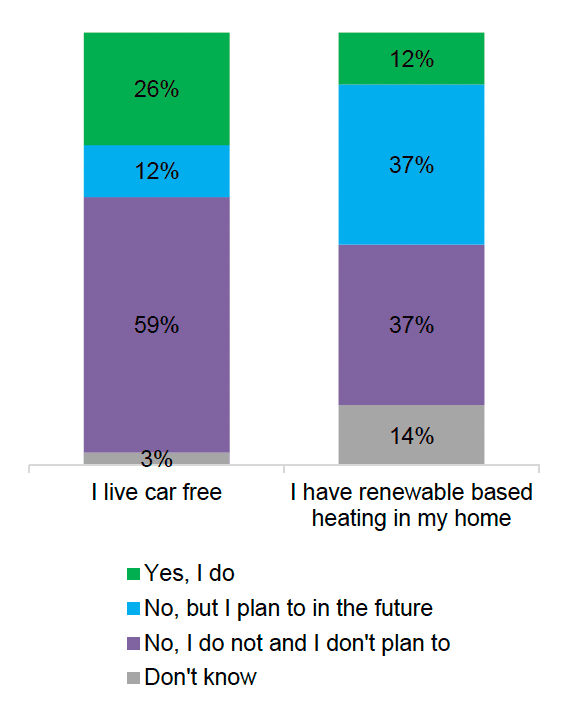
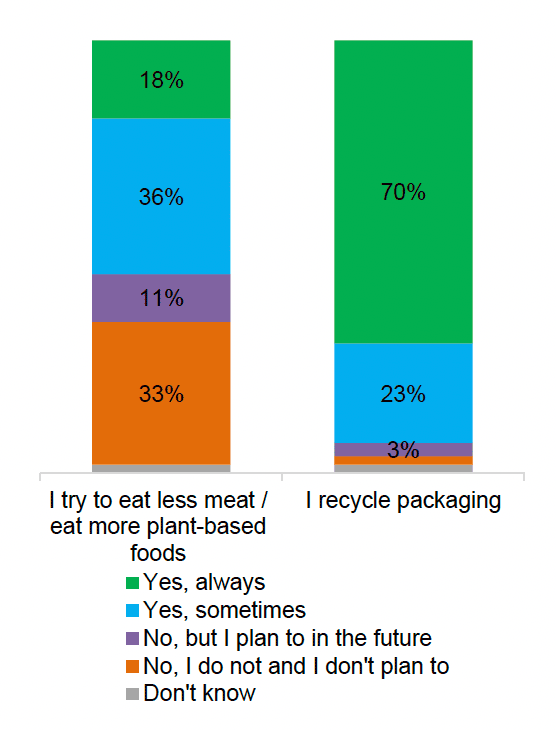
Unweighted base (1623), single response question
Unweighted base (1782), single response question
- Those who have a household income of £52,000 or more are less likely than average to say they live car-free than the general population (13% cf. 26%). These respondents are more likely to say they plan to install renewable based heating in their homes in the future (46% cf. 37%).
- Almost two thirds of highly educated respondents currently try to eat less meat or eat more plant-based foods (64% cf. 54%).
- Respondents who live in the most deprived areas are significantly more likely to currently live car free than those in the least deprived areas (39% cf. 18%). Those in the least deprived areas are also significantly more likely to say they do not live car free and do not plan to so (71% cf. 59%). Respondents in rural areas are more likely to say they always recycle packaging, with 80% of them saying so compared to 70% of the general population.
| Total | 14-17 | 18-24 | 25-34 | 35-44 | 45-54 | 55-64 | 65+ | |
|---|---|---|---|---|---|---|---|---|
| Live car free | 26% | 23%* | 38% | 34% | 24% | 24% | 23% | 19% |
| Have renewable based heating in home | 12% | 12%* | 21% | 19% | 10% | 11% | 9% | 8% |
| Eat less meat / eat more plant-based foods | 54% | 49% | 46% | 61% | 54% | 55% | 51% | 54% |
| Recycle packaging | 93% | 90% | 85% | 88% | 91% | 92% | 97% | 99% |
*Low base size as only those aged 16 and over were asked this question
Note: All statistically significant changes from the total are highlighted. Green highlights denote data significantly higher than total. Blue highlights denote data significantly lower than total.
Younger age groups are more likely to currently live car free or have renewable based heating in their homes (Table 8). Over a third of 18-24-year-olds and 25-34-year-olds say they live car free (38% and 34% respectively), whilst around a fifth say they have renewable based heating in their home (21% and 19% respectively). Over three fifths (61%) of 25-34-year-olds also say they eat less meat, significantly more than the total population.
Conversely, the vast majority of older age groups are more likely to say they currently recycle packaging. 97% of 55-64-year-olds and 99% of those aged 65 and over say they currently do so.
| Total | 14-17 | 18-24 | 25-34 | 35-44 | 45-54 | 55-64 | 65+ | |
|---|---|---|---|---|---|---|---|---|
| Live car free | 12% | 16%* | 17% | 16% | 12% | 12% | 6% | 10% |
| Have renewable based heating in home | 37% | 48%* | 35% | 45% | 45% | 42% | 31% | 28% |
| Eat less meat / eat more plant-based foods | 11% | 15% | 19% | 11% | 12% | 10% | 7% | 8% |
| Recycle packaging | 3% | 6% | 3% | 6% | 5% | 4% | - | - |
*Low base size as only those aged 16 and over were asked this question
Note: All statistically significant changes from the total are highlighted. Green highlights denote data significantly higher than total. Blue highlights denote data significantly lower than total.
Higher proportions of 25-34-years-olds answer that they are more likely to incorporate green actions into their lives in the future than older cohorts (Table 9). Nearly two fifths (16%) of 25-34-year-olds, for example, say they will live car free, compared to just one tenth of those aged 65 or over (10%). Similarly, over two fifths (45%) of 25-34-year-olds and 35-44-year-olds say they will have renewable based heating in their home in the future, compared to over a quarter of those aged 65+ (28%).
18-24-year-olds are significantly more likely than total to say they plan to eat less meat (19% and 11% respectively). 14-17-year-olds have the second highest proportion of respondents saying they plan to eat less meat (15%).
4.4 Pro-environmental actions and their impact
Of the four actions previously asked about, having renewable heating in homes and living car free were ranked equally by respondents as the actions they thought would reduce greenhouse gases the most. Almost a third (31% and 30% respectively) of respondents identified one of these two actions as having the biggest effect (Figure 21). Around a fifth (19%) selected recycling packaging as the action with the biggest effect, and 14% selected eating less meat or more plant-based foods.
Recent research has suggested that living car free is likely to be the action that would reduce greenhouse gas emissions the most, followed by adopting a vegan diet, installing renewable based heating at home and recycling packaging.[7]
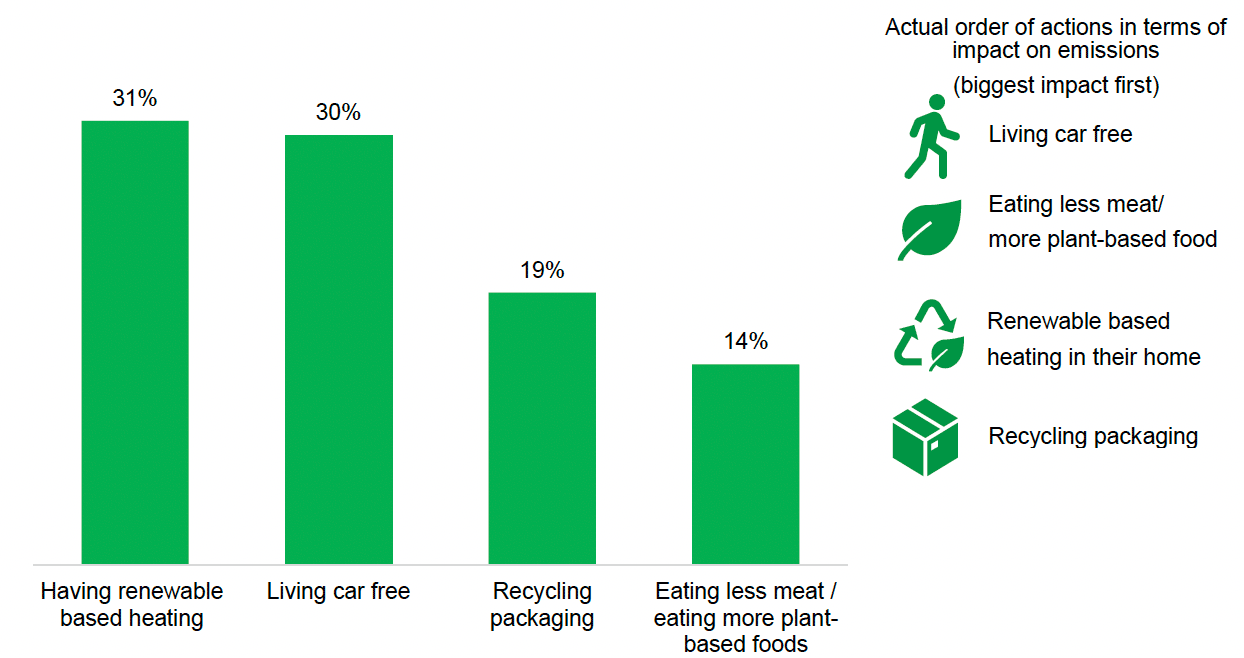
Base: Unweighted base (1782), 5% answered 'don't know', ranked response question. Correct response sourced from IOPscience - Quantifying the potential for climate change mitigation of consumption options
Three in 10 respondents (30%) accurately ranked living car free as the action that would have the biggest impact on reducing greenhouse gas emissions. 16% accurately ranked eating less meat / eating more plant-based foods second. 20% correctly ranked having renewable based heating in their homes as being the third most impactful action. 27% were right in ranking recycling packaging as the least most impactful action.
4.5 Reasons for not doing pro-environmental actions
Where a respondent said they do not currently do one of the green actions listed above, they were then asked what stops them from doing that action, with responses set out in Figure 22.
When asked why they do not live car free, half of respondents (50%) state that it is the inconvenience to their lives that prevents them from doing so. Over a third (35%) also said they simply did not want to do so. When asked why they do not eat less meat or more plant-based foods, six in 10 respondents (59%) said they did not want to do so. Over half (51%) of Scottish adults noted the expense of installing renewable based heating in their home, with a third (34%) saying they would need government support in order to do so.
18-24-year-olds are more likely to say they do not live car free than the total population because it is too inconvenient (63% cf. 50%). Over two thirds (68%) of 55-64-year-olds say they don't eat less meat simply because they don't want to, compared to 59% of the total population.
Under three tenths (29%) of rural respondents say they do not live car free currently because they don't want to. This is significantly lower than the general population, where over a third (35%) of the general population say so. Those who live in the least deprived areas of Scotland are more likely to say that cost is a barrier to installing renewable based heating in their homes (58% cf. 51%).
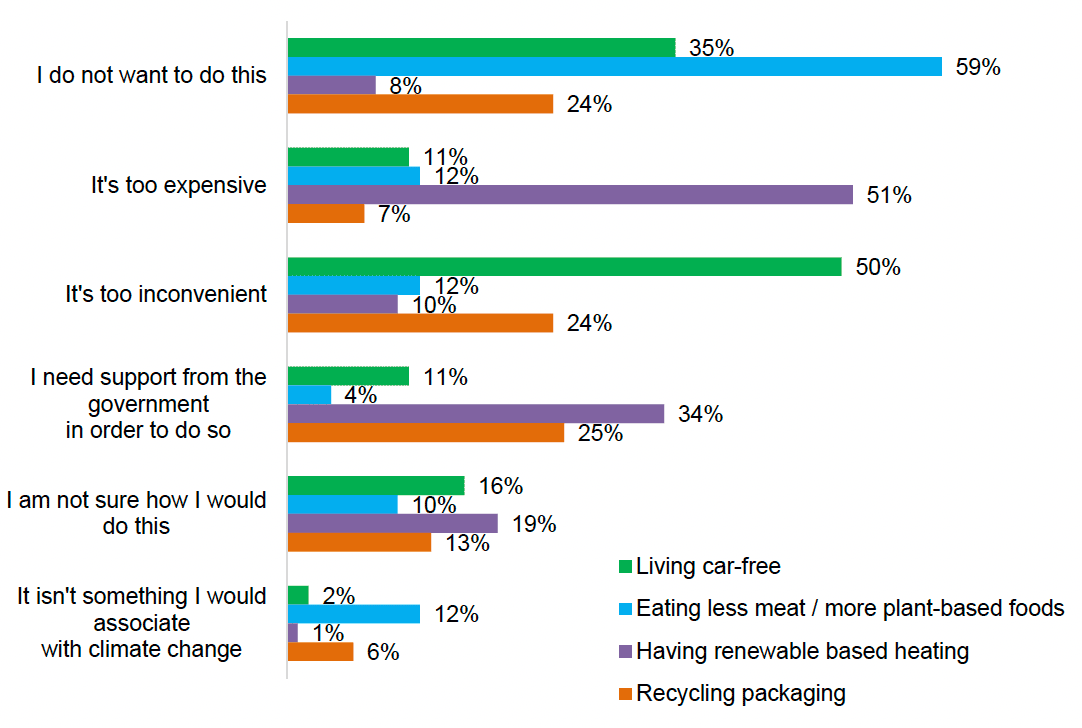
Unweighted base: Living car-free (1155); Eating less meat / more plant-based foods (786); Having renewable based heating (1197); Recycling packaging (77), multiple response question
4.6 Individual perceptions on pro-environmental actions
Finally, when asked whether they felt others were doing more or less than them to tackle climate change, almost half of the Scottish public (47%) said that on average, people are doing about the same as them to tackle climate change. Nearly a quarter (24%) of people said others are doing less than them (Figure 23).
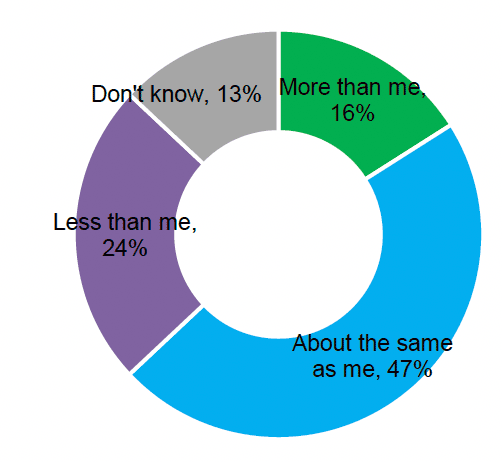
Base: Unweighted base (1782), single response question
When looking at those who say others are doing less than them by age cohort (Table 10), 25-34-year-olds and 45-54-year-olds are significantly more likely than average to say that others are doing less than them to tackle climate change (both 29%). Moreover, the proportion of those who agree that others are doing less than them decreases in older age groups, with just over a fifth (21%) of those aged 55-64 and 65s or overs saying so. 14-17-year-olds are the least likely to believe that others are doing less than them, with less than one fifth believing others do less than them (17%).
| Total | 14-17 | 18-24 | 25-34 | 35-44 | 45-54 | 55-64 | 65+ | |
|---|---|---|---|---|---|---|---|---|
| Less than me | 24% | 17% | 23% | 29% | 22% | 29% | 21% | 21% |
Note: All statistically significant changes from the total are highlighted. Green highlights denote data significantly higher than total. Blue highlights denote data significantly lower than total.
Figure 24 demonstrates that respondents who believe they have a positive impact on Scotland reaching net zero emissions, believe that others are doing less than them to tackle climate change. Almost a third of those who believe they have a positive impact on net zero emissions (32%) believe others are doing less than them to tackle climate change, compared to just under a quarter of the general population (24%). Conversely, more respondents who believe they have a negative impact on helping Scotland reach net zero emissions say others are doing more than them to tackle climate change (28% cf. 16%).
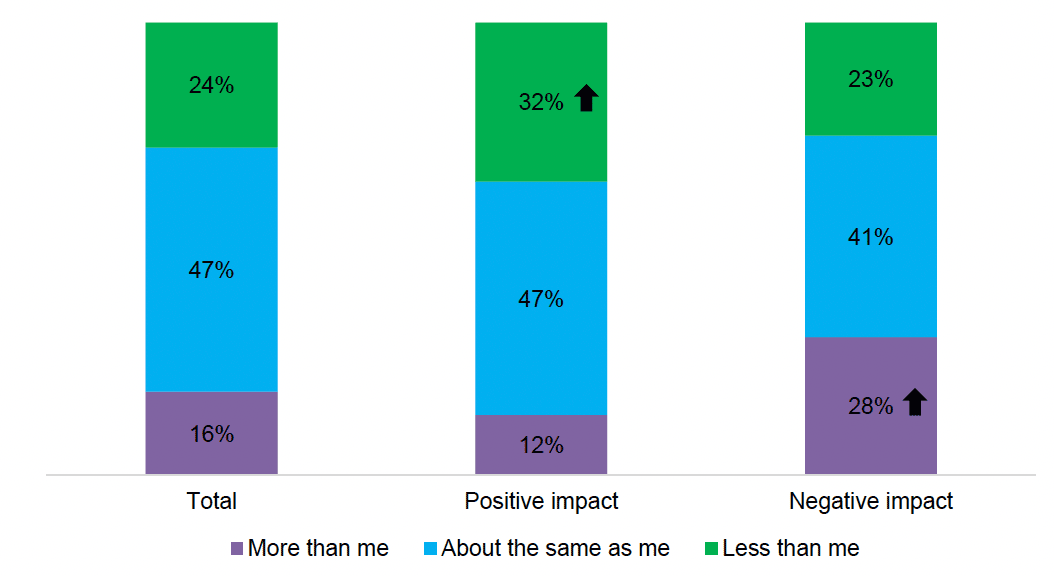
Base: Unweighted base (1782), single response question
Note: Arrows signify data that is significantly higher than total to a confidence of 95%.
Contact
There is a problem
Thanks for your feedback